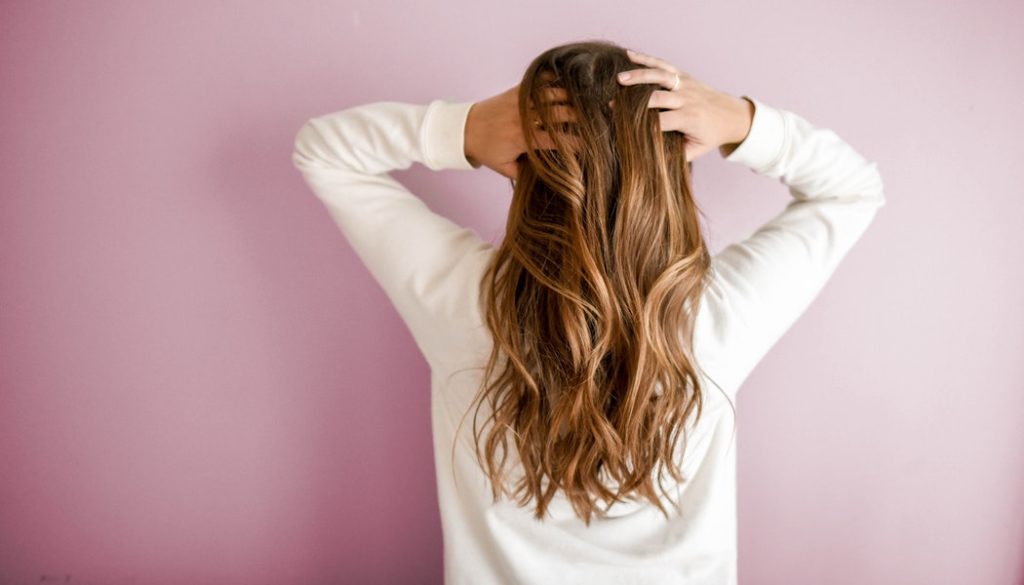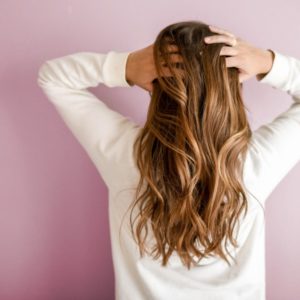You can use all the best hair products and invest in expensive salon-quality shampoos, but when it comes down to it, optimally healthy hair comes from healthy hair follicles and a proper diet.
There is a myriad of ways that eating a healthy and balanced diet can make improvements in your hair.

Below, we will cover 6 specific ways that a nutrient-dense way of eating can benefit your hair.
1. Adequate protein can help hair grow as fast as possible
Hair is mostly composed of protein, so if there is not enough of it to go around in your body, you may find that growth is slow or you may even lose hair more.
Technically, your hair isn’t essential for life, so in the event of a protein scarcity, your hair growth may be the first thing to get cut.
Get plenty of protein from lean meats, eggs, beans, legumes, nuts, and seeds to make sure there is plenty of protein to go around.
2. Eating plenty of iron can stave off anemia-related hair loss
Even moderate levels of iron deficiency anemia can lead to some level of hair loss or slow growth, so ensuring that you are getting plenty of iron each day is necessary for a healthy head of hair.
People who are vegetarian or vegan may need to keep an eye on their iron consumption, and women who are menstruating may be at a higher risk of anemia due to monthly losses.
Iron-rich foods include meat, seafood, beans, and dark leafy greens.
If you are concerned about your iron levels, ask your doctor to check them out. If your levels are very low, they may recommend an iron supplement or using a daily iron-containing multivitamin. Your doctor may also advise you to take an iron IV therapy, which delivers the necessary amount of iron directly to your bloodstream and replenishes iron levels in a short period of time.
3. Vitamin C is an antioxidant that helps protect follicles from damage
Vitamin C is an antioxidant powerhouse that helps scavenge free radicals from your body before they can cause damage to cells.
Free radicals can damage all parts of your body, including your hair follicles which are responsible for the growth of your hairs.
Make sure that you are getting plenty of vitamin C in your diet each day in the form of citrus fruits, bell peppers, strawberries, broccoli, brussels sprouts, and potatoes.
As you can see, many of the foods with high levels of vitamin C are very colorful. So, if you are making an effort to eat a wide range of colorful fruits and vegetables each day, you are likely on the right track to getting plenty of vitamin C.
4. Omega 3s can up the healthy oils and shine of your hair
That healthy hair shine doesn’t just come from applying fancy hair oil, truly lustrous strands start from growth with an ample supply of healthy scalp hairs and omega-3 fatty acids to shine them up.
Your body can’t produce omega 3s on its own, so these must be consumed or taken as a supplement to get them into your body.
Good sources of omega-3s include fish, seafood, nuts, seeds, plant oils, or foods fortified with omegas.
5. Adequate Biotin boosts keratin production
Keratin is a structural protein found in your hair that can help it look smooth, strong, and glossy.
You can help boost keratin production by making sure that your diet contains enough biotin to help avoid a deficiency.
Biotin is found in foods such as eggs, legumes, nuts, seeds, sweet potatoes, liver, mushrooms, bananas, broccoli, and avocados.
And, while increasing your biotin intake may not lead to any changes in your hair if you are getting enough already, a deficiency of biotin has been correlated with increased hair loss.
6. Drinking plenty of water can help keep your scalp hydrated
Your scalp is the foundation of all hair growth, and it contains all of your hair follicles which are the factories of your strands. Your scalp is essentially the soil for your hair, so keeping it healthy and happy is key for great hair.
Your scalp is covered in skin that needs to be kept hydrated and moisturized just like the rest of your skin. And, if it is dehydrated, dry, flaky, or irritated, it may not live up to its hair production potential.
Make sure that you are maintaining adequate levels of hydration if you want your hair to look as healthy as possible.
Aim for 8 X 8-ounce glasses of water a day, and if you exercise a lot or are out in the heat often, you may need more than that.

